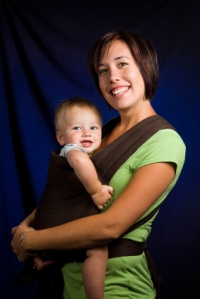Babies are the most wonderful gift but they can be heavy! In situations where buggies and pushchairs are not suitable, parents are often faced with the prospect of having to carry their baby, which can lead to back pain and fatigue. Parents ideally want their babies as close to them as possible and often choose the aid of a baby sling to support their little one in a comforting way, meaning parents then have their hands free to go about their daily tasks.

The safest method of baby wearing is in a carrier that keeps the newborn baby solidly against the parent’s body, in an upright position. Parents should ensure that they keep their baby’s chin off their chest, thereby keeping the airway free for breathing.
While RoSPA fully under stands the attraction of using baby slings, we are very concerned about a worrying number of fatalities recorded by parents using certain types of baby slings to carry their children.
These slings are made of soft fabrics that wrap around the chest so that on-the-go parents can carry their babies or use it as another way to bond, keeping close contact between the child and the parent. They have become increasingly popular in recent years and slings have also been promoted by baby experts as a way to help babies feel secure and calm or as an alternative aid for mothers to use for breastfeeding.
It is important to mention that not all slings are dangerous and they have been in use for thousands of years. The safest method of baby wearing is in a carrier that keeps the newborn baby solidly against the parent’s body, in an upright position. Parents should ensure that they keep their baby’s chin off their chest, thereby keeping the airway free for breathing.
RoSPA is not calling for a ban on these products, nor urging parents not to use them. Instead we are advising parents to be careful with their selection of the type of sling and to be aware that there are risks attached. RoSPA advocates products that keep babies upright and allow parents to see their baby and to ensure that the face isn’t restricted.
The Consortium of UK Sling Manufacturers and Retailers provided the following advice to baby sling wearers: Keep your baby close and keep your baby safe. When you’re wearing a sling or carrier, don’t forget the T.I.C.K.S:
- Tight
- In view at all times
- Close enough to kiss
- Keep chin off the chest
- Supported back.
But what many parents may not be aware of is that at least 16 deaths across the world have been reported as a result of using baby slings. The US authorities have advised parents to be cautious when using infant slings for babies younger than four months. Slings can pose a suffocation hazard in two different ways:
- A sling’s fabric can press against a baby’s nose and mouth, blocking the baby’s breathing and causing suffocation within a minute or two
- The other scenario involves slings where the baby is cradled in a curved or “C-like” position, nestling the baby below the parent’s chest or near their stomach. This can cause a baby who doesn’t have strong neck control to flop its head forward, chin-to-chest, restricting the infant’s ability to breathe. In scenarios like this, babies may not be able to cry for help and could slowly suffocate, according to the US authorities.
Did you know that in 2010, over a million baby slings were recalled in the US by a manufacturer over fears that they could cause suffocation? It followed three deaths linked to The SlingRider and Wendy Bellissimo ranges, made by Infantino. As a result, the Consumer Product Safety Commission (CPSC) urged parents to stop using the slings for babies under four months. The CPSC also stipulated that all products should be sold with clear safety instructions.
In the US, the case of one-week-old Derrik Fowler, in Oregon, is used by many safety advocates as an example of the suffocation risks associated with slings. Derek died in a sling of positional asphyxia or suffocation, according to court records. Derrik was carried in a “bag style” sling, in which the fabric wraps around the parent’s neck and cradles the child in a curved position.
RoSPA hopes that this advice is useful to new parents. If consumers have concerns about any products they have seen advertised, they should contact the Citizens Advice consumer service helpline on 08454 04 05 06.
Philip Le Shirley, RoSPA’s product safety adviser.